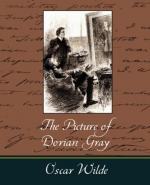He told me right out before everybody. It was
horrible! Why is your friendship so fateful to
young men? There was that wretched boy in the
Guards who committed suicide. You were his great
friend. There was Sir Henry Ashton, who had to
leave England, with a tarnished name. You and
he were inseparable. What about Adrian Singleton,
and his dreadful end? What about Lord Kent’s
only son, and his career? I met his father yesterday
in St. James Street. He seemed broken with shame
and sorrow. What about the young Duke of Perth?
What sort of life has he got now? What gentleman
would associate with him? Dorian, Dorian, your
reputation is infamous. I know you and Harry
are great friends. I say nothing about that
now, but [80] surely you need not have made his sister’s
name a by-word. When you met Lady Gwendolen,
not a breath of scandal had ever touched her.
Is there a single decent woman in London now who
would drive with her in the Park? Why, even her
children are not allowed to live with her. Then
there are other stories,—stories that you
have been seen creeping at dawn out of dreadful houses
and slinking in disguise into the foulest dens in
London. Are they true? Can they be true?
When I first heard them, I laughed. I hear them
now, and they make me shudder. What about your
country-house, and the life that is led there?
Dorian, you don’t know what is said about you.
I won’t tell you that I don’t want to
preach to you. I remember Harry saying once
that every man who turned himself into an amateur
curate for the moment always said that, and then broke
his word. I do want to preach to you.
I want you to lead such a life as will make the world
respect you. I want you to have a clean name
and a fair record. I want you to get rid of
the dreadful people you associate with. Don’t
shrug your shoulders like that. Don’t be
so indifferent. You have a wonderful influence.
Let it be for good, not for evil. They say
that you corrupt every one whom you become intimate
with, and that it is quite sufficient for you to enter
a house, for shame of some kind to follow after you.
I don’t know whether it is so or not.
How should I know? But it is said of you.
I am told things that it seems impossible to doubt.
Lord Gloucester was one of my greatest friends at
Oxford. He showed me a letter that his wife
had written to him when she was dying alone in her
villa at Mentone. Your name was implicated in
the most terrible confession I ever read. I
told him that it was absurd,—that I knew
you thoroughly, and that you were incapable of anything
of the kind. Know you? I wonder do I know
you? Before I could answer that, I should have
to see your soul.”
“To see my soul!” muttered Dorian Gray, starting up from the sofa and turning almost white from fear.
“Yes,” answered Hallward, gravely, and with infinite sorrow in his voice,—“to see your soul. But only God can do that.”




